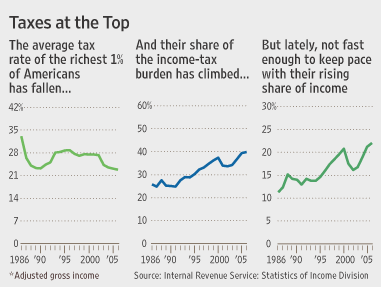WASHINGTON -- The housing and financial crisis convulsing the U.S. is powering a new wave of government regulation of business and the economy. Federal and state governments alike are increasingly hands-on in their effort to deal with failing businesses, plunging house prices, worthless mortgages and soaring energy prices. The steps add up to a major challenge to the movement toward deregulation that has defined American governance for much of the past quarter-century since the "Reagan Revolution" of the early 1980s. In fact, some proponents today of a bigger oversight role for government are Republican heirs to the legacy of President Reagan.http://online.wsj.com/article_print/SB121694460456283007.html
Thursday, July 24, 2008
Wednesday, July 23, 2008
Mortgage Rates Near a Year High
Home-mortgage rates are nearing their highest levels in a year, adding to pressures on the already weak housing market.
Rates on conforming 30-year fixed-rate mortgages rose by nearly 0.40 percentage point in the past week to an average of 6.71%, according to HSH Associates in Pompton Plains, N.J. Rates on jumbo loans, which are too big to be eligible for purchase by Fannie Mae or Freddie Mac, currently average 7.84%.
The higher rates are making it more difficult for borrowers to refinance and putting another crimp on weak home sales. "It's a tough market and rates going up isn't helping it," said Steve Walsh, a mortgage broker in Scottsdale, Ariz.
Mortgage rates typically move in line with rates on 10-year Treasurys. Treasury rates have risen, but so has the spread between rates on 30-year mortgages and 10-year Treasurys, said Nicholas Strand, a mortgage strategist at Barclays Capital. http://online.wsj.com/article/SB121677010658575383.html?mod=todays_us_money_and_investing
Rates on conforming 30-year fixed-rate mortgages rose by nearly 0.40 percentage point in the past week to an average of 6.71%, according to HSH Associates in Pompton Plains, N.J. Rates on jumbo loans, which are too big to be eligible for purchase by Fannie Mae or Freddie Mac, currently average 7.84%.
The higher rates are making it more difficult for borrowers to refinance and putting another crimp on weak home sales. "It's a tough market and rates going up isn't helping it," said Steve Walsh, a mortgage broker in Scottsdale, Ariz.
Mortgage rates typically move in line with rates on 10-year Treasurys. Treasury rates have risen, but so has the spread between rates on 30-year mortgages and 10-year Treasurys, said Nicholas Strand, a mortgage strategist at Barclays Capital. http://online.wsj.com/article/SB121677010658575383.html?mod=todays_us_money_and_investing
Richest Americans See Their Income Share Grow

In a new sign of increasing inequality in the U.S., the richest 1% of Americans in 2006 garnered the highest share of the nation's adjusted gross income for two decades, and possibly the highest since 1929, according to Internal Revenue Service data.
Meanwhile, the average tax rate of the wealthiest 1% fell to its lowest level in at least 18 years. The group's share of the tax burden has risen, though not as quickly as its share of income.
The figures are from the IRS's income-statistics division and were posted on the agency's Web site last week. The 2006 data are the most recent available.
The figures about the relative income and tax rates of the wealthiest Americans come as the presumptive presidential candidates are in a debate about taxes. Congress and the next president will have to decide whether to extend several Bush-era tax cuts, including the 2003 reduction in tax rates on capital gains and dividends. Experts said those tax cuts in particular are playing a major role in falling tax rates for the very wealthy. http://online.wsj.com/article/SB121677287690575589.html?mod=todays_us_page_one
House Passes FAA Safety Legislation
WASHINGTON -- The House passed legislation that would overhaul the Federal Aviation Administration's approach to airline safety, following disclosures of lax oversight by agency inspectors.http://online.wsj.com/article/SB121677609061675827.html?mod=hps_us_whats_news
Sunday, July 20, 2008
Bankers get bailouts before borrowers

By GRETCHEN MORGENSON
Published: July 20, 2008
THE credit crisis has exposed and worsened a dangerous and deepening divide in this country between a vast number of average borrowers and a fairly elite slice of corporations, banks and executives enriched by the mortgage mania.
Borrowers who are in trouble on their mortgages have seen their government move slowly — or not all — to help them. But banks and the executives who ran them are quickly deemed worthy of taxpayer bailouts.
On the ground, this translates into millions of troubled borrowers, left to work through their problems with understaffed, sometimes adversarial loan servicing companies. If they get nowhere, they lose their homes.
Taxpayers, meanwhile, are asked to stand by with money to inject into Fannie Mae and Freddie Mac, the government-sponsored mortgage finance giants, should they need propping up if loan losses balloon.
The message in this disconnect couldn’t be clearer. Borrowers should shoulder the consequences of signing loan documents they didn’t understand, but with punishing terms that quickly made the loans unaffordable. But for executives and directors of the big companies who financed these loans, who grew wealthy while the getting was good, the taxpayer is coming to the rescue.
“The banks are too big to fail and the man in the street is too small to bail,” said John C. Bogle, the founder of the Vanguard Group, the mutual funds giant, who is a philosopher of finance.
Mr. Bogle is working on his seventh book, titled “Enough,” which is scheduled to be published in November. He said he was disturbed by the extreme speculation that spread into the entire economy during the housing boom and that now threatens both consumers and investorshttp://www.nytimes.com/2008/07/20/business/economy/20gret.html?ex=1374206400&en=c623c7b6d1904b15&ei=5124&partner=permalink&exprod=permalink
Tuesday, July 15, 2008
The Fannie and Freddie Fallout
By GRETCHEN MORGENSON
The New York Times - IT’S dispiriting indeed to watch the United States financial system, supposedly the envy of the world, being taken to its knees. But that’s the show we’re watching, brought to you by somnambulant regulators, greedy bank executives and incompetent corporate directors.
This wasn’t the way the “ownership society” was supposed to work. Investors weren’t supposed to watch their financial stocks plummet more than 70 percent in less than a year. And taxpayers weren’t supposed to be left holding defaulted mortgages and abandoned homes while executives who presided over balance sheet implosions walked away with millions.
Over the course of this 18-month financial crisis, we have lurched from land mine to land mine. Last week’s was all about Fannie Mae and Freddie Mac, the giant government-sponsored enterprises set up to provide affordable housing across the nation. By issuing debt, these shareholder-owned companies guarantee or own more than $5 trillion in home mortgages. Got that? $5 trillion.http://www.nytimes.com/2008/07/13/business/13gret.html?ex=1373688000&en=a640b55198507941&ei=5124&partner=permalink&exprod=permalink
The New York Times - IT’S dispiriting indeed to watch the United States financial system, supposedly the envy of the world, being taken to its knees. But that’s the show we’re watching, brought to you by somnambulant regulators, greedy bank executives and incompetent corporate directors.
This wasn’t the way the “ownership society” was supposed to work. Investors weren’t supposed to watch their financial stocks plummet more than 70 percent in less than a year. And taxpayers weren’t supposed to be left holding defaulted mortgages and abandoned homes while executives who presided over balance sheet implosions walked away with millions.
Over the course of this 18-month financial crisis, we have lurched from land mine to land mine. Last week’s was all about Fannie Mae and Freddie Mac, the giant government-sponsored enterprises set up to provide affordable housing across the nation. By issuing debt, these shareholder-owned companies guarantee or own more than $5 trillion in home mortgages. Got that? $5 trillion.http://www.nytimes.com/2008/07/13/business/13gret.html?ex=1373688000&en=a640b55198507941&ei=5124&partner=permalink&exprod=permalink
Subscribe to:
Posts (Atom)